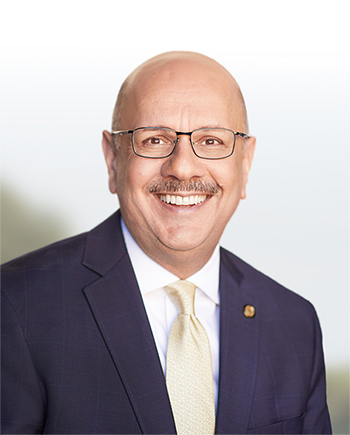April 10, 2025
Dear CMU Ambassadors,
I hope that 2025 is treating you well. At Carnegie Mellon University, like so many of our higher education peers, change seems to be a meaningful constant shaping the new year.
In January, as part of our President’s Lecture Series and Deeper Conversations programming, we welcomed long-time The Washington Post foreign affairs columnist David Ignatius to campus. David spoke of the shifting federal landscape; he also reflected on the U.S. presidential election and his long career as a journalist covering politics and foreign affairs.
Fortunately, CMU is uniquely situated to excel in rapidly changing conditions, and our contributions to society continue to grow, as the news clips included in this edition of CMU Ambassadors illustrate.
Some highlights:
- We lead the way in interdisciplinary education. Inc. Magazine showcased CMU as a model for what institutions should do to remain relevant in a fast-evolving world. Additionally, Fast Company called out CMU’s Joseph Ballay Center for Design Fusion as a powerful example of our role as an “entrepreneurial powerhouse.” We are where industry goes to school and where school creates industries.
- We continue to shape the next generation of scientists. For example, undergraduate student Claire Gist proposed that CMU add a quantum track for physics majors in the Mellon College of Science, and her ambition became reality this year.
- We also serve as a model in higher education. In October, we celebrated the dedication of our Highmark Center for Health, Wellness and Athletics. This project — opening a vibrant hub of holistic student health and well-being — was only possible due to the generosity of more than 300 alumni, parents, faculty and staff donors and a $35 million lead gift from Highmark Health.
- Our students themselves serve as role models in giving back, and making the world safer for all. Consider first-year Ph.D. student Seunghyun Lee in the School of Computer Science, who discovered a safety risk in Google Chrome’s source code. He was recognized by Google with a financial reward, which he in turn donated to picoCTF — CMU’s cybersecurity competition and learning platform for middle, high school and college students. His generosity inspired a match from Google, resulting in a combined gift of $462,000 to picoCTF.
- Our alumni continue to break records, such as School of Computer Science alumnus Blake Scholl, whose company, Boom Supersonic, developed a civil supersonic jet that broke the sound barrier in January. This is an incredible milestone in Blake’s inspiring journey to resurrect high-speed passenger air service, with the first American-made civil supersonic jet.
- In turn, the real world inspires creativity and innovation in our faculty and students. When Moshe Mahler, a College of Fine Arts alumnus and assistant professor in CMU’s Entertainment Technology Center, met Pittsburgh artist and performer Bill Shannon, who dances and skateboards on crutches, he was inspired to tell the story in film. The resulting animated short documentary, “The Art of Weightlessness,” was a seven-year passion project — and an invaluable learning experience for participating CMU students. The film won first prize at the SIGGRAPH 2024 Electronic Theater Awards and qualified for the Academy Awards longlist, as profiled in the Pittsburgh Jewish Chronicle.
- CMU’s strengths in entrepreneurship and enterprise creation are charting new courses for industry. Distinguished Service Professor of Entrepreneurship Sean Ammirati recently encouraged his students to use generative artificial intelligence tools to advance their business ideas. By treating AI as their “cofounder,” the students attracted the attention of venture capitalists in record time. The exercise was so successful, it inspired The New York Times to cover the use of AI tools in helping small businesses accelerate their path to profitability.
Beyond these news stories, Carnegie Mellon students, faculty and alumni continue to earn acclaim and awards within their respective disciplines. The list of recent recognitions includes three faculty members — Ismaila Dabo in the Department of Materials Science and Engineering, Claire le Goues in the Software and Societal Systems Department, and Aaditya Ramdas in the Statistics & Data Science and Machine Learning departments — who earned Presidential Early Career Awards, the highest accolade bestowed by the U.S. government for early-career scientists and engineers.
Additionally, former faculty member Geoffrey E. Hinton earned the 2024 Nobel Prize in Physics for his foundational work in machine learning with artificial neural networks.
And in the arts, former Carnegie Mellon School of Drama faculty member Paul Tazewell won an Oscar for Best Costume Design for his work on the movie “Wicked,” and College of Fine Arts alumnus Stephen Schwartz earned his ninth Academy Award nomination for creating the film’s original score.
I hope that these examples explain why David Ignatius, during his recent visit to campus, called CMU “a national treasure.”
I couldn’t agree more, and I recognize the powerful role that our Ambassador community plays in shaping this reality. Your incredible advocacy, encouragement and fierce dedication drive our momentum and fuel our success. Thank you for all that you do to support and enhance Carnegie Mellon’s mission and impact today.
I hope to see you all soon!
Regards,
Farnam Jahanian
President and Henry L. Hillman President's Chair
 Carnegie Mellon University President Farnam Jahanian
Carnegie Mellon University President Farnam Jahanian
